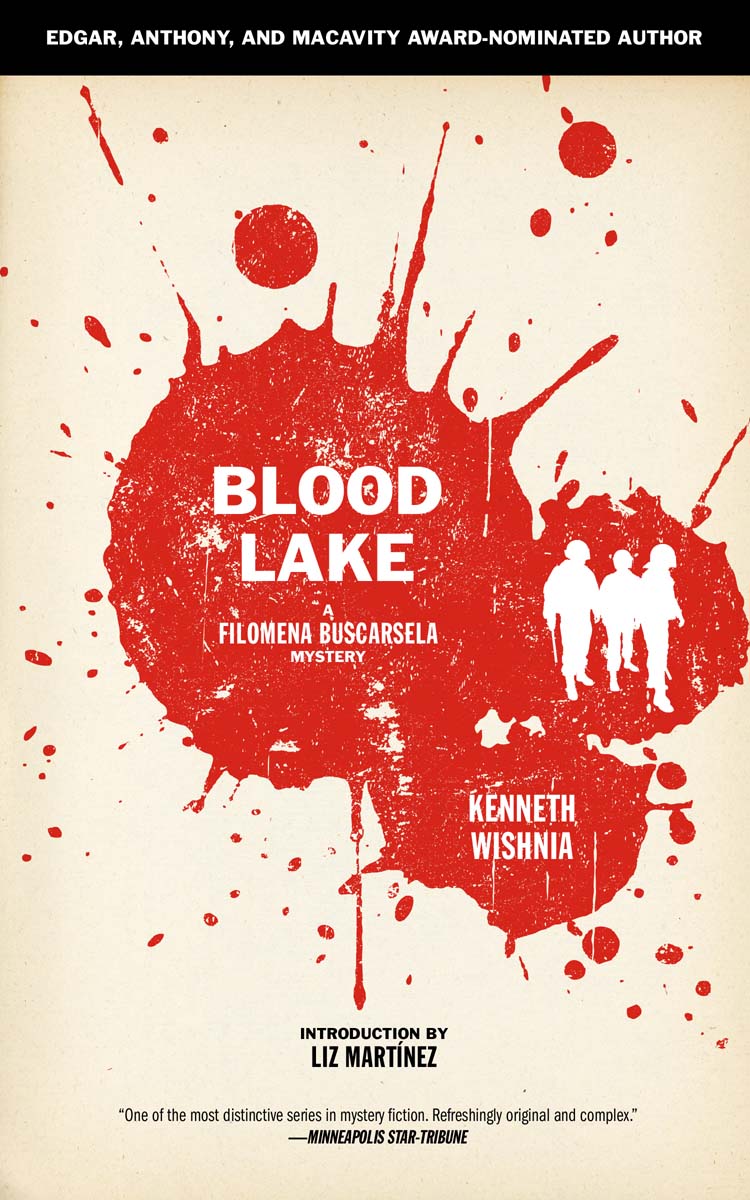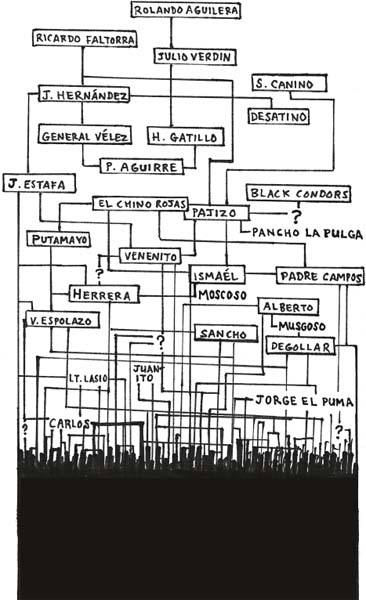Blood Lake
Authors: Liz Kenneth; Martínez Wishnia


Blood Lake
“In a stunning portrait of a country just over the line between law and chaos,
Blood Lake
gives the reader urgent, pulse-pounding prose, an unstoppable, appealing narrator, and a sense that the veneer of civilization may be, in places, very thin indeed.” âS.J. Rozan, Edgar Awardâwinning author of author of
Ghost Hero
“The first page of
Blood Lake
is strong, on a dead run; and the rest of the book ain't too dusty, neither.” âHarlan Ellison, winner of the Edgar, Hugo, Nebula, and Emmy Awards, and all-around living legend
“There are very talented but woefully underappreciated writers in our field who deserve a much bigger audienceâ Ken Wishnia chief among them.” âReed Farrel Coleman, Shamus Awardâwinning author of the Moe Prager series
“Wishnia's brand of gritty surrealism jolts the reader with startling images and jarring contrasts. [He] evokes a country and a culture vividly and unforgettably.” â
Publishers Weekly
“Successfully serves up exotic atmosphere, complex family relations, social unrest, and dazzling characterization.” â
Booklist
“Gritty and realistic. There is too much to praise about this book, so suffice it to say that every element that makes a book great is in this novel, making for a truly memorable read.” â
Romantic Times
“Enormously engaging. It's as if Wishnia were attempting to rescue the thriller from the bloat and preposterousness of Ludlumization in order to return it to its more Graham Greene-like roots in a recognizably mean real worldâjust as Chandler and Hammett rescued detective fiction from drawing-room gentility and yanked it down to the mean streets that had always been its natural habitat.” â
Washington Post
“One of the most distinctive series in mystery fiction. Refreshingly original and complex.” â
Minneapolis Star-Tribune
“Another absorbing page-turner.” â
New Orleans Times-Picayune
“
Blood Lake
works equally well as a private eye novel, an atmospheric regional mystery and a political thriller that relies on people, not techno-gadgets, to tell a story of a country under siege.” â
South Florida Sun-Sentinel
“Passionate, fierce, sardonic, hypnotic, compelling, furious, incendiary, brimming with anger, mercy, righteousness and self-deprecation, a knockout narrator who hits the reader in the heart and the head. If there's any justice, Fil Buscarsela will find a home on readers' shelves and in their thoughts. Just try to keep her out.” â
Drood Review of Mystery

Â
Â
Â
Â
Blood Lake
© 2014 Kenneth Wishnia
This edition © 2014 PM Press
All rights reserved. No part of this book may be transmitted by any means without permission in writing from the publisher.
ISBN: 978â1â60486â430â4
Library of Congress Control Number: 2013956929
Cover: John Yates /
www.stealworks.com
Interior design by briandesign
10 9 8 7 6 5 4 3 2 1
PM Press
PO Box 23912
Oakland, CA 94623
Printed in the USA, by the Employee Owners of Thomson-Shore in Dexter, Michigan.
Para las familias Correa, Freire, Mejia, Mendez y Peña
Â
Â
Caveat
This story takes place in a mythic Ecuador. But, like all myths, much of it is true.

This frontispiece is provided as a means of clarifying the Ecuadorian political situation.
Perhaps, after all, America has never been discovered; I myself would say that it had merely been detected.
âOscar Wilde

The dedication page says, “This story takes place in a mythic Ecuador,” meaning that the author borrowed elements from the country's Andean neighbors, Colombia and Peru, to heighten the dramatic impact of the story. So there is no “North Guayas Militia,” a fictional right-wing paramilitary group, controlling the northern section of the coastal province of Guayas, and Ecuador has no significant left-wing military guerrilla activity like the Black Condor Brigade, aside from incursions made by rebel groups like Colombia's FARC in the Amazonian region. But much of what is described in these pages really happened, and the author witnessed most of it firsthand. Many of the events are drawn from the author's two-year stay in Ecuador from 1986 to 1988, and again from 1993 to 1994, when the country was far less stable and developed than it is today, and electricity, water, communications, and democracy itself were unreliable at best. (Nowadays, cell phones are everywhere, and the country has set a record for the longest period of peaceful transition from one elected leader to the next in its history as a republic.)
This colors and shapes the narrative of
Blood Lake
in a unique way: while the rest of the novels in the Filomena Buscarsela series depict the New York metropolitan area in all its gritty detail, with some hyperbolic touches, this novel conflates events that unfolded in different regions over the course of many years and compresses them into a single insanity-filled period of about three weeks.
Blood Lake
takes place during a violent and corrupt presidential campaignâis there any other kind?âand the names have been changed, but the author had a front-row seat at the crazy party. He was present when a prominent member of a
leading political party told a reporter that a newspaperman who wrote “nothing but lies” about their candidate would be killed if he ever returned to Ecuador. He was in the crowd when outside agitators launched a well-planned attack on a political rally in the city of Cuenca, too. And he was harassed by the cops (and the immigration authorities) on numerous occasions, as described in the pages of this novel as well. You get the idea.
Yet reading
Blood Lake
is a bit like diving into a time warp. Although the story is set in the twenty-first century, it is largely based on the author's experiences when Ecuador was a very different country. The Filomena series generally takes place in real historical time: Ronald Reagan is president in the first novel in the series,
23 Shades of Black
; George H.W. Bush is president in
Soft Money
; somebody named Clinton is president in
The Glass Factory
; and there was a gap in the manuscript of
Red House
for several months during the fall of 2000 while we all waited to find out who the hell was president. It turned out to be George W. Bush. Damn it. And Bush is still president in the world of
Blood Lake
, even though many of the scenes in the novel are based on events that occurred years earlier.
Though Filomena's distinct voiceâa mixture of social realism and stand-up comedyâstill drives the narrative,
Blood Lake
is also written on a broader canvas than the previous novels in the series
.
It's written in an amalgam of styles, combining elements of the international thriller with a more fantastical, consciously literary sensibility. Certain passages display the influence of magical realism; check out
Chapter 13
and you'll see what I mean. It also contains a few stylistic quotationsâhomages to the literary styles of such prominent Ecuadorian authors as Alicia Yánez CossÃo and Eliécer Cárdenas, whose novels and stories Wishnia has translated into English for literary publications in the United States.
When she provided a blurb for this book, author S.J. Rozan told Ken that the line-by-line writing in
Blood Lake
was the best he'd ever done, but she felt like she wanted the
story to be forty pages longer so that everything would be explainedâexcept she also felt that even with those forty extra pages, she
still
wouldn't understand everything that happened. He replied, “That's exactly how I want you to feel.” This is not a Fodor's guide to Ecuador. Wishnia wants readers to feel a bit disoriented and unsure of their footing, since Filomena is going through that as well. She's always standing on shaky ground in this novel.
Filomena also displays incredible strength, as we see her go from an idealistic college student to the worldly mother of an adolescent daughter, who practically brings down an international conspiracy single-handedly. When asked if the character is based on his wife, Mercy, a native Ecuadorian, Ken is quick to point out that “Filomena has all of my wife's
good
qualities. The rest of her insanity is all mine.”
One thing Wishnia gets right about
latino
culture is that Filomena has something in this novel that she doesn't have in the othersâa supportive, extended family. This is one of the things that Wishnia admires about Ecuadorian culture: most of the people who live there can't afford car insurance or home insurance, which is prohibitively expensive and not required by law. So if your house burns down, you're out of luck, because you have no insurance. But what you
do
have is fifty cousins who will show up the next day with cinder blocks and bags of cement, and help you rebuild your house. This novel celebrates that collectivist spirit.
Liz MartÃnez
Las Vegas, NV
The righteous man knows the soul of his beast.
âProverbs 12:10
SOMEONE
is taking the stairs three at a time. For a moment my chest turns as brittle as glass, and my pounding heart nearly shatters it. But cops don't move that fast, and there's only one set of feet bounding up to the landing. It's not a knock, it's a pound, the door flies open, and Johnny bursts into my room. I leap to my feet, scattering my torturously scribbled notes for the all-important political philosophy exam across the bed and floor.
“Juanitoâ!” I prepare for the thrill of his embrace.
“Where
is
he?”
“You just got out and
that's
what you want to do first?” But he looks right through me, with blood in his eye, and I realize that he did not just get out. He broke out. And not too carefully, either.